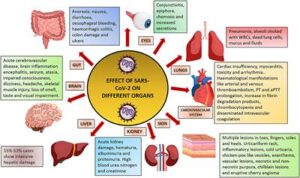New studies have indicated that severe SARS-CoV-2 infection can cause acute respiratory distress syndrome and multi-organ failure.

The two studies carried out by two research groups provided new insights on the pathophysiology of severe COVID-19.
The researchers carried out a single-nucleus RNA sequencing of 116,000 nuclei from snap-frozen lungs that were collected shortly after death from 19 individuals who died of COVID-19, as well as seven control lungs.
They found that lungs from COVID-19-deceased persons were highly inflamed and had dense infiltrations of aberrantly activated macrophages.
Read Also: Single-cell atlases dissect tissue destruction by SARS-CoV-2
The lead researcher of the first study Melms J. C. and his colleagues at the Department of Medicine, Division of Hematology/Oncology, Columbia University Irving Medical Center, New York also found that there was evidence of plasma cells that are capable of producing neutralising antibodies, but noted that the T cell responses appeared to be impaired — indicating that, despite potentially sufficient humoral immune responses, inadequate T cell responses may contribute to lethal COVID-19.
Also, the study led by Toni Dalorey and his colleagues from the Klarman Cell Observatory, Broad Institute of MIT and Harvard, Cambridge, presents single-cell atlases of 23 lungs, 16 kidneys, 16 liver, and 19 heart autopsy samples from individuals who died of COVID-19 and compared the spatial atlases of 14 SARS-CoV-2-infected lungs.
However, the authors of both studies published in Nature on May 14 said their studies are limited by their small sample size.















Discussion about this post